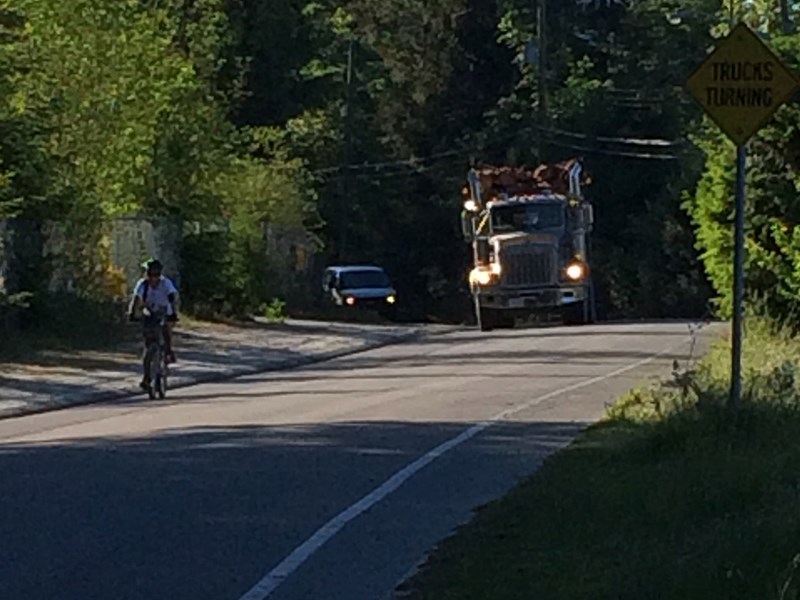Logging truck safety is always an issue in forestry communities. Powell River has been fortunate not to have a recent accident involving one of the large vehicles, but odds are it will happen eventually.
City of Powell River councillor Maggie Hathaway said as much when the issue of log haulers and public safety was brought before committee of the whole on May 1.
Jerry Eskes, representing a group of Cranberry ratepayers, 25 of whom were in the public gallery, pushed for action on logging trucks going through their neighbourhood.
Eskes said rigs from logging activity in the Inland and Haslam lakes area use Cranberry Street a dozen times a day. He said he sees a colossal problem for the city to try to come to terms with full and empty logging trucks going through the city to log sorts north and south of town.
The most visible and, perhaps, dangerous area is Marine Avenue, which is a provincial highway and Powell River’s busiest professional and retail road. Hathaway said the conflict between trucks, cars, bicycles and pedestrians on the narrow thoroughfare is an accident waiting to happen.
“Every day I watch them going both ways along Marine and it’s only a matter of time because they’re fully loaded and people are riding their bikes, stepping off the sidewalk and trying to cross the street,” she added. “There’s a crosswalk right in front of my office and what I hear when these trucks brake really scares me.”
That fear is real. Within days last fall, there were five logging truck accidents in BC, including two on the same day in Sechelt and Chase, and one that caused a fatality in Whistler.
“While no added regulations were brought in following those incidents, the BC government has stepped up safety and compliance inspections on logging trucks and increased patrols of areas where there is a lot of logging taking place,” said ministry of transportation and infrastructure senior public affairs officer Leanne Flood.
The ministry is responsible for regulating commercial trucking, including speed, height, length, weight of loads, proper licenses and inspections.
If legally loaded, licensed and insured, logging trucks are allowed to travel on Highway 101.
“The ministry’s Commercial Vehicle Safety Enforcement (CVSE) officers patrol and check vehicles to ensure all commercial trucks operating on our provincial highways meet our strict safety requirements,” said Flood.
In Cranberry, Eskes said logging trucks are using a short section of Cranberry Street from Haslam Street to Lindsay Park.
“That's all too narrow, treacherous and unstable a road for those heavy hauling trucks,” said Eskes. “They're using residential streets. Those are not industrial haul roads.”
Eskes said the drivers are going through Cranberry because it is a shortcut.
“Shortcuts compromise safety,” he added.
It’s not just safety, according to Eskes. The heavily loaded trucks can damage infrastructure, he said.
The city is responsible for roads within the municipality and Eskes said the residents are calling for weight restrictions, warning signs and a 30-kilometre per hour speed limit.
The trucks come from Inland Lake and Haslam Lake, where Tla’amin Nation, through Tla’amin Lake Contracting, is currently active on a community forest.
“It's our joint-venture partnership company, which Tla'amin Lake Contracting has with Goat Lake Forest Products, that is harvesting our community forest up there,” said Thichum Forest Products manager Craig Galligos.
Thichum is responsible for Tla’amin’s natural forestry resources. Goat Lake handles the hauling.
There are two alternative routes out from the logging project to the Tla'amin log sort north of the city, according to Goat Lake owner Rory Maitland. Both present their own set of problems.
Maitland said going the opposite way on Cranberry Street is tight to navigate and the other option would be along Marine.
“If there was an easy solution to this we would certainly do it," said Maitland. "Routes are routes. There's not a whole lot of options for us. We're taking it seriously."



